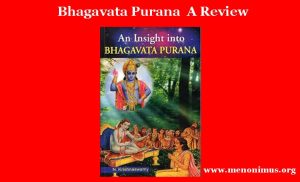Bhagavata Purana | A Review
Bhagavata Purana A Review
Bhagavata Purana-A Review
The ‘Bhagavata Purana,’ often referred to simply as the ‘Srimad Bhagavatam,’ is one of the most revered and influential texts in Hinduism. Comprising twelve books and over eighteen thousand verses, this ancient scripture offers profound insights into the nature of existence, the divine, and the path to spiritual realization. Here, we present a detailed review of the ‘Bhagavata Purana’:
Historical and Cultural Significance:
The ‘Bhagavata Purana’ is believed to have been composed between the 8th and 10th centuries CE. It is attributed to the sage Vyasa, who is also credited with composing the epic ‘Mahabharata.’ The text holds immense cultural significance in Hinduism, as it expounds upon various theological, philosophical, and devotional concepts.
Structure and Contents:
The ‘Bhagavata Purana’ is organized into twelve books, or “skandhas,” each dedicated to different aspects of spiritual wisdom, cosmology, and devotion. The initial skandhas lay the foundation for the narrative, while the later ones delve deeper into the stories of various divine incarnations, primarily focusing on Lord Krishna.
Philosophical Themes:
The ‘Bhagavata Purana’ explores various philosophical concepts, strongly emphasizing devotion (bhakti) as the path to salvation. It discusses different yogic practices, but bhakti yoga (the path of devotion) is elevated as the most accessible and effective means of attaining union with the divine.
Theology and Divinity:
The ‘Bhagavata Purana’ presents a comprehensive theological framework, describing the nature of the divine (Brahman) and its various manifestations, particularly Lord Krishna. It emphasizes the idea of the divine being both immanent and transcendent, accessible through personal relationships.
Narada’s Teachings:
The narrative structure involves the sage Narada recounting the stories of the divine to the king and devotee, Parikshit. Narada emphasizes that the recitation and hearing of these divine stories can cleanse one’s heart and mind, leading to spiritual realization.
Stories of Incarnations:
The ‘Bhagavata Purana’ narrates the stories of various divine incarnations (avatars), prominently focusing on Lord Krishna. These stories offer profound insights into the divine play (leela) of Krishna, his teachings, and the significance of his actions.
Concept of Dharma:
The text addresses the concept of dharma (righteousness or duty) in various contexts. It emphasizes the importance of adhering to dharma while also highlighting that true dharma goes beyond mere ritualistic actions and involves a sincere heart and devotion to the divine.
Cultural and Ethical Values:
The ‘Bhagavata Purana’ promotes virtues such as compassion, humility, detachment, and selflessness. It warns against the pursuit of materialism and highlights the transient nature of worldly pleasures.
Language and Literary Style:
The text is composed in elegant Sanskrit prose and poetry. Its style combines narrative, dialogue, and philosophical discourse, making it engaging and accessible to both scholars and lay readers.
Influence and Legacy:
The ‘Bhagavata Purana’ has profoundly shaped Hindu theology, philosophy, art, literature, and devotional practices. It has inspired countless poets, philosophers, and saints throughout history, contributing to the rich tapestry of Hindu thought.
Critiques and Interpretations:
While the ‘Bhagavata Purana’ has a widespread following, interpretations of its teachings and stories can vary. Some critics argue that the text’s emphasis on devotion might overshadow other paths of spiritual realization.
In conclusion, the ‘Bhagavata Purana’ stands as a timeless spiritual treasure within Hinduism. Its exploration of devotion, philosophy, and divine incarnations offers readers a profound understanding of the nature of reality and the path to spiritual liberation. Whether approached from a theological, philosophical, or devotional perspective, this scripture continues to guide and inspire seekers on their spiritual journeys. 0 0 0.
Read More: Tips for Writing Essay
N. B. The article ‘originally belongs to the book ‘The Reviews of Epic Literature Around the World Vol-I‘ by Menonim Menonimus.








